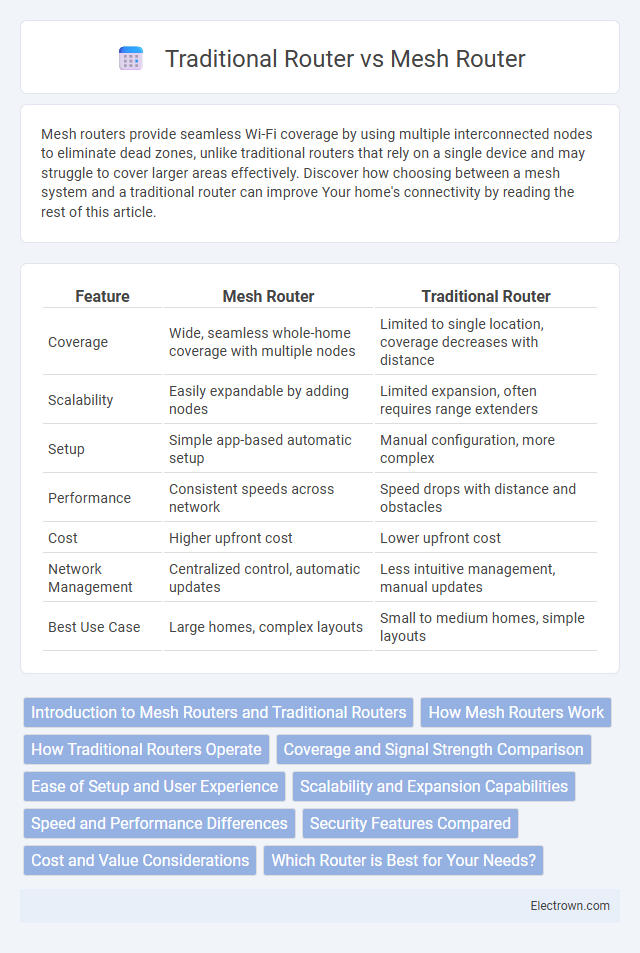Mesh routers provide seamless Wi-Fi coverage by using multiple interconnected nodes to eliminate dead zones, unlike traditional routers that rely on a single device and may struggle to cover larger areas effectively. Discover how choosing between a mesh system and a traditional router can improve Your home's connectivity by reading the rest of this article.
Table of Comparison
| Feature | Mesh Router | Traditional Router |
|---|---|---|
| Coverage | Wide, seamless whole-home coverage with multiple nodes | Limited to single location, coverage decreases with distance |
| Scalability | Easily expandable by adding nodes | Limited expansion, often requires range extenders |
| Setup | Simple app-based automatic setup | Manual configuration, more complex |
| Performance | Consistent speeds across network | Speed drops with distance and obstacles |
| Cost | Higher upfront cost | Lower upfront cost |
| Network Management | Centralized control, automatic updates | Less intuitive management, manual updates |
| Best Use Case | Large homes, complex layouts | Small to medium homes, simple layouts |
Introduction to Mesh Routers and Traditional Routers
Mesh routers use multiple nodes to create a seamless, extended Wi-Fi network, eliminating dead zones and providing consistent coverage across larger areas. Traditional routers rely on a single device to broadcast Wi-Fi signals, which can lead to limited range and weaker connectivity in distant or obstructed spaces. Mesh systems dynamically route data through the most efficient path, while traditional routers depend on static connections, impacting overall network performance and reliability.
How Mesh Routers Work
Mesh routers use multiple nodes that communicate wirelessly to create a seamless network covering your entire home or office, eliminating dead zones common with traditional routers. Each node acts as a router, dynamically directing data traffic to optimize connection speed and reliability. This decentralized system allows your devices to switch automatically to the strongest node, ensuring consistent internet performance throughout your space.
How Traditional Routers Operate
Traditional routers operate by connecting a single device to the internet and distributing the network signal through wired Ethernet or a single wireless access point. They rely on a central hub that broadcasts Wi-Fi signals within a limited range, often leading to dead zones and weaker connectivity in larger homes or multiple floors. Signal strength and connection quality diminish with distance from the router, making them less effective for expansive or obstructed areas.
Coverage and Signal Strength Comparison
Mesh routers provide superior coverage and signal strength by using multiple interconnected nodes that eliminate dead zones and maintain strong connections throughout large or multi-story homes. Traditional routers rely on a single device, which can lead to weaker signals and limited coverage, especially in larger spaces or areas obstructed by walls. Mesh systems dynamically route traffic between nodes, optimizing signal strength and ensuring consistent internet performance across all connected devices.
Ease of Setup and User Experience
Mesh routers offer simplified setup processes through intuitive mobile apps that guide users step-by-step, enabling seamless network expansion without complex configurations. Traditional routers often require manual setup involving web interfaces and network settings, which can be challenging for non-technical users. User experience with mesh systems is enhanced by automatic device optimization and consistent coverage, while traditional routers may suffer from dead zones and require frequent adjustments.
Scalability and Expansion Capabilities
Mesh routers offer superior scalability and expansion capabilities compared to traditional routers by allowing seamless addition of multiple nodes to extend Wi-Fi coverage across large or multi-story homes. Traditional routers rely on range extenders that often create separate networks with inconsistent speeds, limiting smooth expansion. Your network's flexibility and performance improve significantly with a mesh system designed to grow with your connectivity needs.
Speed and Performance Differences
Mesh routers provide consistent high-speed Wi-Fi by using multiple nodes that communicate to eliminate dead zones, offering seamless coverage throughout large areas. Traditional routers rely on a single device, which can result in weaker signals and slower speeds as the distance from the router increases or as obstacles interfere. Mesh systems optimize performance by dynamically routing traffic between nodes to reduce latency and maintain stable connections, significantly outperforming traditional routers in complex environments.
Security Features Compared
Mesh routers often provide enhanced security through automatic firmware updates, network-wide encryption, and integrated firewall protection, ensuring consistent defense across all connected nodes. Traditional routers may offer strong security but often require manual updates and separate configurations for each device, increasing vulnerability risks. Mesh networks also support advanced features like guest networks and device isolation uniformly, improving overall home network safety.
Cost and Value Considerations
Mesh routers typically involve higher upfront costs compared to traditional routers due to multiple interconnected units designed to cover larger areas with seamless Wi-Fi. Traditional routers are generally more affordable but may require additional range extenders to address dead zones, potentially increasing overall expenses. Evaluating value involves balancing the initial investment against improved coverage and consistent performance offered by mesh systems, especially in larger homes or spaces with complex layouts.
Which Router is Best for Your Needs?
Mesh routers provide seamless Wi-Fi coverage across large or multi-story homes by using multiple nodes that communicate with each other, ideal for eliminating dead zones. Traditional routers offer strong performance for smaller spaces with a single device delivering Wi-Fi, making them cost-effective and simpler to set up. Choose a mesh router for expansive, complex layouts demanding consistent connectivity; opt for a traditional router if your environment is compact and budget-focused.
Mesh Router vs Traditional Router Infographic

 electrown.com
electrown.com